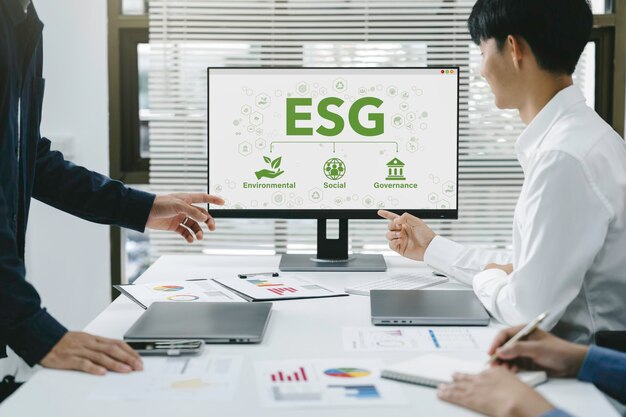10 Ways South African SMEs Can Develop a Robust ESG Framework

In today’s business environment, companies are increasingly being judged not only on their financial performance but also on their environmental, social, and governance (ESG) practices. For South African SMEs, building a robust ESG framework is no longer optional—it’s essential for long-term sustainability, attracting investment, and gaining customer trust. Here are ten ways South African SMEs can develop a strong ESG framework.
1. Understand the Importance of ESG
Before implementing an ESG strategy, SMEs need to understand its significance. ESG focuses on environmental stewardship, social responsibility, and governance principles. This goes beyond compliance; it is about creating value, improving your business’s impact on society, and ensuring transparency and ethical decision-making. Embracing ESG can open doors to new markets, improve relationships with stakeholders, and help navigate regulatory environments.
2. Assess Your Business’s Current ESG Impact
Start by evaluating your company’s current environmental footprint, social impact, and governance practices. This could involve energy use, waste management, employee relations, diversity and inclusion policies, and how decisions are made at the executive level. Understanding your baseline helps identify areas for improvement and serves as a foundation for developing an effective ESG strategy.
3. Set Clear and Achievable Goals
Once you’ve assessed your current ESG standing, set realistic, measurable goals. These should address environmental sustainability (e.g., reducing carbon emissions or waste), social goals (e.g., community engagement or improving employee welfare), and governance objectives (e.g., enhancing transparency or diversity at the board level). Make sure the goals are aligned with your company’s overall mission and values, and clearly communicate them to your team.
4. Integrate ESG into Your Business Strategy
An effective ESG framework should be integrated into your business strategy, not treated as a separate initiative. This means making ESG considerations part of decision-making processes at every level. For example, consider how new products or services might impact the environment, or how hiring decisions can improve workplace diversity. Ensure ESG principles are reflected in long-term planning and daily operations.
5. Engage Stakeholders in the ESG Process
For SMEs in South Africa, stakeholder engagement is crucial in building a successful ESG framework. This includes your employees, customers, suppliers, investors, and the communities where you operate. Engage them in dialogue to understand their concerns and expectations regarding your company’s ESG practices. This feedback can help shape more meaningful and impactful initiatives while building trust and loyalty among your stakeholders.
6. Focus on Energy Efficiency and Resource Management
Environmental sustainability is a key component of any ESG strategy. For SMEs in South Africa, where energy costs are high and load shedding is frequent, focusing on energy efficiency can have both economic and environmental benefits. Consider investing in renewable energy solutions like solar power, and optimize your resource management to reduce waste. Efficient water use and responsible waste disposal are especially important in a country facing environmental challenges like drought and pollution.
7. Support Local Communities
Building a socially responsible business means supporting the communities in which you operate. SMEs can achieve this through initiatives such as offering local employment opportunities, participating in community development projects, or supporting small local suppliers. These actions not only improve social outcomes but also strengthen your brand’s relationship with the local market, leading to long-term business sustainability.
8. Prioritize Employee Welfare and Development
An effective ESG framework prioritizes the well-being of employees. Offer fair wages, safe working conditions, and opportunities for skills development and career progression. In South Africa, this could also mean embracing diversity and inclusion to reflect the country’s rich cultural landscape. Prioritizing employee welfare leads to higher job satisfaction, productivity, and employee retention.
9. Establish Transparent Governance Structures
Good governance is critical to the success of an ESG strategy. Establish transparent governance structures, including clear lines of accountability and oversight. Make sure that ethical business practices are followed and that your company complies with local regulations, such as South Africa’s Broad-Based Black Economic Empowerment (B-BBEE) policies. Implement anti-corruption policies and ensure that decision-making processes are transparent and inclusive.
10. Track and Report ESG Progress
Regularly track your ESG performance to ensure you are meeting your goals. Use key performance indicators (KPIs) to measure success in areas such as carbon reduction, social impact, and governance improvements. Reporting your ESG progress, whether in annual reports or via other communications, shows transparency and accountability. This not only builds trust with stakeholders but also demonstrates your commitment to continuous improvement.
Developing a robust ESG framework is essential for South African SMEs looking to thrive in an increasingly conscious and competitive marketplace. By focusing on environmental sustainability, social responsibility, and good governance, businesses can improve their long-term success while contributing to positive change in South Africa. Implementing these 10 steps can help SMEs align their operations with modern values, attract investment, and build stronger relationships with customers and communities.




